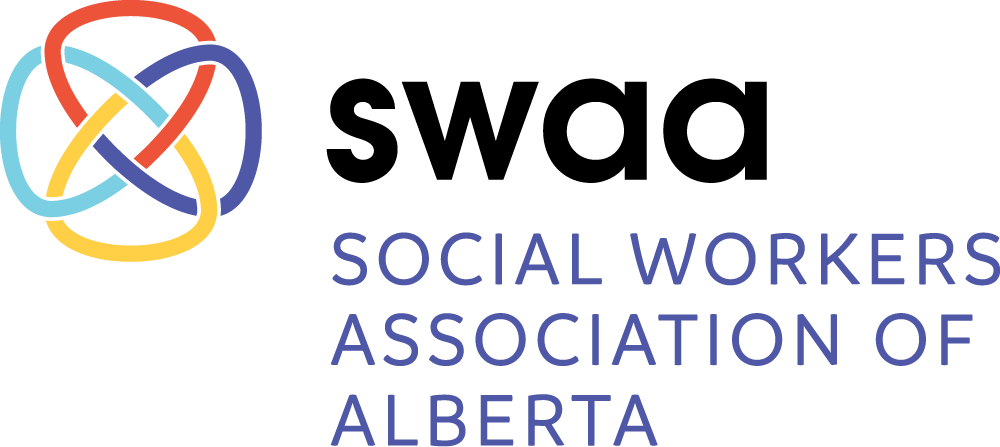National Indigenous History Month
This week marks the beginning of National Indigenous History Month in Canada. Throughout the month of June, we will recognize and celebrate the diverse heritage, rich culture, and history of First Nations, Inuit, and Metis Peoples. This month, we invite Alberta social workers and the broader community to join in recognizing the history and contributions of First Nations, Inuit, and Métis peoples. Indigenous peoples have been the original caretakers of this land for thousands of years, and their contributions continue to shape our society in profound ways. The unique and strong connections social workers make with communities provide us the opportunity to encourage all Canadians to join us in the continued learning and education about Indigenous history.
SWAA would like to highlight the work of two Indigenous social workers, to begin the process of sharing some of the incredible contributions that Indigenous peoples have made to the field of social work.
Dr. Raven Sinclair: Dr. Sinclair, of Cree, Assiniboine, and Saulteaux heritage, is a professor of social work at the University of Regina. She is known for her research on Indigenous child welfare, particularly the impacts of the Sixties Scoop, a period during which Indigenous children were removed from their families and placed into non-Indigenous homes. Her work has helped raise awareness and promote healing within Indigenous communities (Longman, 2018).
Dr. Cindy Blackstock: A member of the Gitxsan First Nation, Cindy Blackstock is a renowned social worker and advocate for Indigenous children's rights. She is the Executive Director of the First Nations Child and Family Caring Society of Canada and has played a critical role in bringing national attention to the inequities faced by Indigenous children in the welfare system. Her efforts have led to significant policy changes and improvements in child welfare services (Canadian Encyclopedia, 2022).
These individuals have not only advanced the field of social work but also championed the rights and well-being of Indigenous communities across Canada.
Throughout June, there are numerous events and activities designed to honor and learn from Indigenous cultures. This year, The Government of Canada has provided a framework of weekly themes that highlight specific aspects of Indigenous history, cultures, and perspectives.
Canadians can explore learning resources on each theme (Government of Canada; Crown-Indigenous Relations and Northern Affairs Canada, 2024):
June 1 to 9: Environment, traditional knowledge, and territory
June 10 to 16: Children and youth
June 17 to 23: Languages, cultures, and arts
June 24 to 30: Women, girls and 2SLGBTQI+ people
We encourage social workers to participate in local events to deepen their understanding and support for Indigenous communities. From cultural festivals and educational workshops to storytelling sessions and art exhibitions, these events provide invaluable opportunities to connect, learn, and celebrate. To stay informed about local events happening throughout the month, you can visit the CASW reconciliation hub (online), local community centres, libraries, and government websites. Together, let’s take this opportunity to acknowledge the past, celebrate the present, and work towards a future of mutual respect and understanding.
Written by social work practicum student, Cathy Jarmain
References
The Canadian Encyclopedia. (2022, August 17). Cindy Blackstock. https://www.thecanadianencyclopedia.ca/en/article/cindy-blackstock
Government of Canada; Crown-Indigenous Relations and Northern Affairs Canada. (2024, March 25). About National Indigenous History Month. https://www.rcaanc-cirnac.gc.ca/eng/1683124800202/1683124846095
Longman, N. (2018). Coming Home: Raven Sinclair and the Sixties scoop. https://www.discoursemagazine.ca/wp-content/uploads/2019/04/Raven-Sinclair-with-cover.pdf
CASW Resources
There is also the Reconciliation: A Starting Point app you can download on your smart device to learn about Indigenous Peoples in Canada, key historical events, and reconciliation initiatives.
Visit the National Centre for Truth and Reconciliation Commission to learn more about the tragic legacy of residential schools, the experiences of families and Survivors as well as the 94 Calls to action to start the healing process.
Canada.ca Resources and Graphics
We encourage you to take some time to learn more about First Nations, Inuit and Métis as well as our collective past. Here are a few ideas of how you can get involved and show your support.
https://www.rcaanc-cirnac.gc.ca/eng/1683124800202/1683124846095
